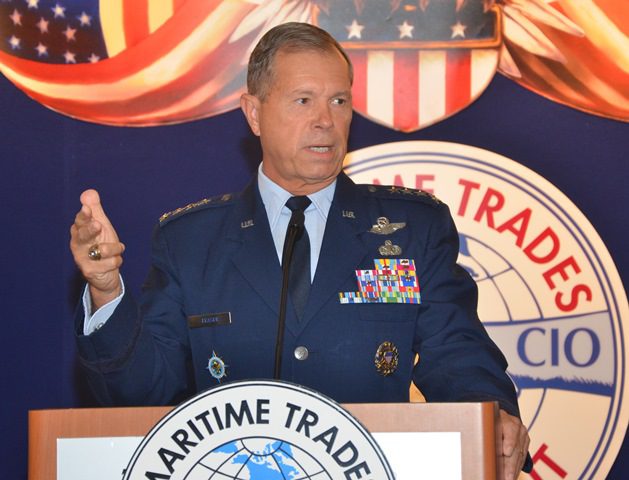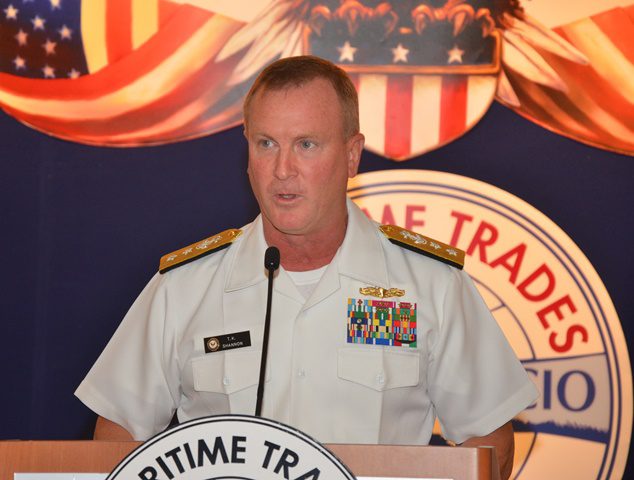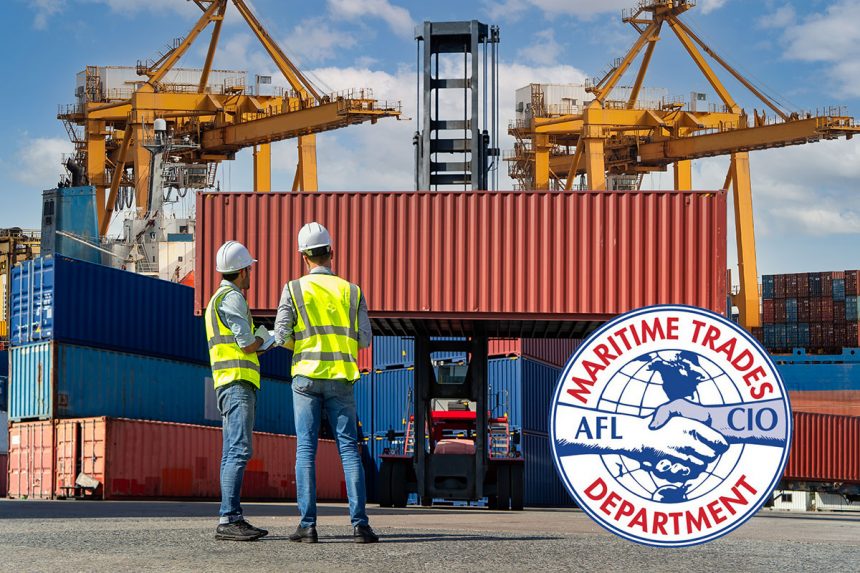

MTD Convention Coverage
The top officers at the U.S. Transportation Command (USTRANSCOM) and U.S. Military Sealift Command (MSC) delivered powerful remarks at the MTD Quadrennial Convention, stressing the enormous value of the U.S. Merchant Marine.
Gen. William Fraser, commander of USTRANSCOM, and Rear Adm. Thomas “T.K.” Shannon, commander of MSC, also emphasized that they are going to bat for the maritime industry during these times of severe budget cuts.
Gen. Fraser addressed the convention in Los Angeles on Sept. 6, while Shannon delivered his remarks one day earlier. Both men received standing ovations as they candidly expressed appreciation for civilian mariners, their unions and American-flag vessel operators. Both also called for an effective national maritime strategy.
Describing MTD officials and the members of MTD-affiliated unions as “tremendous patriots,” Gen. Fraser added, “TRANSCOM is greatly appreciative of what you do, and we couldn’t do our job without you.”
He said rank-and-file mariners and dockworkers “really make us successful. They make us who we are and allow us to do the things that have been talked about, whether responding to a crisis, responding to humanitarian assistance or disaster relief. Even if it’s here in the States, like Hurricane Sandy, or Haiti, or other opportunities that we’ve had to decrease human suffering and save lives, you’ve always responded in an outstanding manner and I can’t thank you enough for that…. Nothing moves without you and those that you represent.”
Fraser pointed out that more than 90 percent of the goods moved “into theater” go by sea.
“In the maritime industry, you’re the backbone of our ability to project our power,” he continued. “It has been amazing to me as I’ve gotten out there and visited a lot of places, because there are a lot of ships at sea. On any average day, we’ve got about 35 of them that are loading, unloading or at sea sailing someplace with our stuff on it. And that’s very, very important to us in order to accomplish our job.”
Turning to the agency’s civilian workforce, he said the fact that those personnel haven’t had a wage increase or any bonuses in three years “is unconscionable, and then they wound up being furloughed. That’s breaking faith with people, and that’s why I’m reaching out to other areas to make sure that others hear our story.”
Gen. Fraser said that because the partnership between the military and the commercial maritime industry has been so successful, it is taken for granted by some who don’t understand the operations. For example, he cited the drawdowns in Iraq and Afghanistan: “If not for our commercial partners being able to turn to in a timely manner to get the job done, we would not have been successful…. Our commercial partners are the key to our success. They really are. You’re the backbone of our success.”
He then detailed his efforts on Capitol Hill and elsewhere to warn legislators and others about the potential harm of reductions to the Maritime Security Program (MSP) and other programs and laws that help maintain the U.S. maritime industry.
“As I look at the future I am concerned about our readiness,” Fraser stated. “When I think of the maritime industry, and individual decisions that are made in stovepipes, it creates a risk for us. It creates a risk for you, for your workforce…. It’s important for us that we maintain our readiness levels, so I’m engaging a lot.”
Gen. Fraser said that the looming possibility of reducing the MSP fleet after reauthorizing the program – and receiving commitments from commercial partners based on that reauthorization – “is just not right, and I have to be able to tell that story on behalf of the maritime industry and what those impacts may be.”
Those efforts include meeting with U.S. Transportation Secretary Anthony Foxx, officials from the Office of Management and Budget, and others.
He concluded, “The Department of Defense couldn’t do our job without the superb relationship we have (with the industry). That’s why I enjoy getting down to the docks. That’s why I enjoy getting on the ships. My staff looks at me as I get out there and I’m talking to these young folks that are on the docks and on the ships, and it just excites me, because they’re proud of what they’re doing. And I couldn’t be prouder of them, because of the professionals they are but also the patriots that they are, the sacrifices that they and their families are making on a day-to-day basis to meet the mission – the mission to continue to have a vibrant maritime industry.”
Rear Adm. Shannon similarly said the maritime industry “is in a bit of crisis. I, for one, am not going to sit on a shelf and do nothing about it. I look forward to partnering with every element of the maritime industry to help leave it in a better place after I’ve been in this job for two or three years.”
He said he appreciated the fact that many of the labor officials attending the convention came up through the ranks, just as he has done. He also comes from a union family – his mother and two brothers all belonged to unions.
“It’s my privilege to be here and look at maritime partners,” he stated. “In my opinion, we defend America together. Now, because I wear a uniform I get the credit. We drive the aircraft carriers. We fly the jets. We take submarines down to the depths of the ocean. We’ve got the Tomahawk shooters out there in the eastern Mediterranean right now poised for action if called on. That’s the stuff that Anderson Cooper and Wolf Blitzer cover, and so the uniform folks get it.
“But it is not lost on me that somebody’s moving strategic fuel stocks around the world,” he continued. “Somebody’s moving all kinds of defense cargo and ammunition around the planet. Somebody’s sitting on a prepositioning ship right now with war reserve materiel ready to weigh anchor and take it wherever the president needs it. And that’s you and the members you represent, and for that I offer you my utmost respect. The whole thing comes to a grinding halt without the United States Merchant Marine supporting what the uniform folks like me do.”
He shared a story from 1980, when he sailed as a cadet on the SIU-crewed Sea-Land Seattle. Rear Adm. Shannon said he never forgot the practical advice given to him by a seasoned AB who, in addition to teaching valuable lessons in seamanship, encouraged him (in colorful terms) to take advantage of promising career opportunities.
“Here we are 33 years later, and it’s my honor to serve as Commander of Military Sealift Command, the largest employer of mariners in the United States of America,” he said.
Evaluating today’s industry, Rear Adm. Shannon said in some ways it’s both the best and worst of times.
“In the worst category, sequestration (automatic federal spending cuts) is putting immense downward pressure on our budgets,” he said. “And it’s not only the loss of funding, but it’s the speed and velocity with which it is happening. It’s not like we could plan for this over a five- or 10-year period, and so it is forcing us to make some very hard choices in a very short amount of time. With the gridlock in our Congress, I don’t see that it’s going to change for the foreseeable future.”
On the positive side, he said that after assuming command of MSC earlier this year, “I know why the Defense Department and many other federal agencies look to us to provide a service, and it’s not just internal MSC staff. It’s our partners like you who I think are the best in the world. Mariners, other maritime trades, you’re the reason why I get up and enjoy going to work in the morning.”
He explained why he believes the Navy will be more important than ever in the years ahead, and also pointed to new-build programs involving the joint high-speed vessels and mobile landing platforms as reasons for optimism. He also cited overwhelmingly positive performances and feedback involving military-civilian hybrid crews on three Seafarers-manned vessels.
He added, “Nothing that Defense does, happens without you. This is a partnership we value…. When the president rings the bell and says it’s time to go, you’re the ones that respond. And I believe our country owes you a debt of gratitude for that.”
He reinforced MSC’s support for the Jones Act “and any other legislative effort to strengthen maritime shipping and shipbuilding…. It’s my honor to serve with you.”

